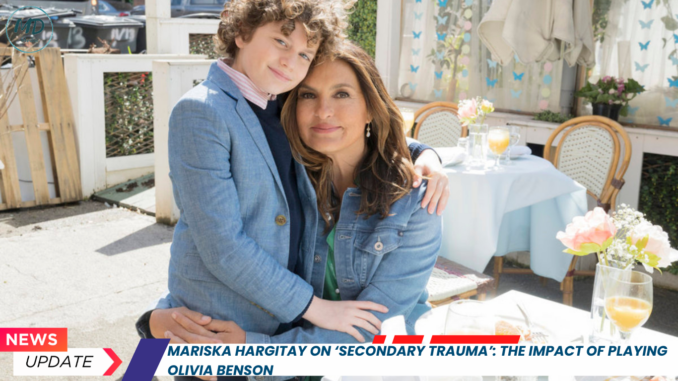
Mariska Hargitay has become a household name thanks to her portrayal of Det. Olivia Benson on NBC’s Law & Order: Special Victims Unit (SVU). For over 25 years, she’s tackled some of the most intense and heartbreaking storylines, bringing to life the struggles of survivors of sexual assault and domestic violence. But behind the scenes, the emotional toll of her role has been profound, leading her to discuss her experiences with secondary trauma in a recent conversation with Selena Gomez. Let’s dive into what this means and how it has shaped Hargitay’s life and career.
What is Secondary Trauma?
So, what exactly is secondary trauma? In a nutshell, it’s the emotional distress that comes from hearing about the experiences of others who have faced trauma. For Hargitay, stepping into the shoes of characters that reflect real-life victims of horrific crimes has been a heavy burden. “When I started the show, I wasn’t aware of how deeply it would go into me,” she shared. The weight of the stories—often ripped straight from the headlines—has been significant, leaving an indelible mark on her psyche.
The Heavy Lifting of Emotional Labor
Hargitay’s role requires not just acting but also an emotional commitment to authentically portray the suffering of survivors. The show doesn’t shy away from depicting heinous crimes—everything from child trafficking to domestic violence. Each episode serves as a reminder of the harsh realities faced by many, and this has affected Hargitay in ways she hadn’t anticipated.
“I barricade myself in here to get a little inspiration,” she explained about her private space on set. “It’s still a difficult world for me.” The need for a sanctuary highlights the emotional labor that comes with portraying such intense material. It’s not just about playing a character; it’s about engaging with narratives that can be triggering and deeply distressing.
A Journey of Awareness and Advocacy
Before joining SVU, Hargitay didn’t have a comprehensive understanding of the issues surrounding sexual assault and domestic abuse. But everything changed during her first year on the show when she attended an awards ceremony for the Mt. Sinai Sexual Assault and Violence Intervention Program. There, she learned alarming statistics about sexual violence, such as one in three women and one in six men are survivors. This knowledge sparked her desire to make a difference, leading to the founding of her Joyful Heart Foundation in 2004.
Joyful Heart Foundation: A Beacon of Hope
The Joyful Heart Foundation aims to transform how society responds to sexual assault, domestic violence, and child abuse. It also works to support survivors in their healing journey. Hargitay’s commitment to this cause is unwavering, as she passionately advocates for change.
Through the End the Backlog program, the foundation has partnered with various police departments to address the backlog of untested rape kits. Their efforts have led to the identification of 22 serial rapists—an incredible achievement that has garnered attention and admiration across the nation.
Hargitay has described the ripple effect of these efforts, noting how they are making changes not just in one city but across the entire country. This initiative is a testament to the power of advocacy and the potential for positive change when awareness is raised.
The Impact of the #MeToo Movement
One of the most significant cultural shifts in recent years has been the #MeToo movement. Hargitay expressed her gratitude for this change, highlighting how it has empowered survivors to share their stories and demand justice. “Now our voices are in chorus together, and they’re just stronger together and louder together,” she noted.
The collective force of these voices is crucial in altering the narrative around sexual violence and creating a safer environment for survivors to speak out. Hargitay believes this cultural awakening is long overdue and is hopeful for the future.
A Personal Evolution
Hargitay’s journey has been as much about personal growth as it has been about professional success. As she reflected on her early days in SVU, she acknowledged that she wasn’t always in a position of power. “I was not the boss and I had no power,” she said. But over the years, she has found her voice, learned her worth, and embraced her vulnerability.
“I think about that often,” she shared. “It’s a really peaceful place to be.” This evolution has allowed her to merge her passion for acting with her commitment to philanthropy. She now feels a deep sense of fulfillment, knowing she can contribute to the healing of others through her work.
Balancing the Weight of Reality
While Hargitay’s role as Olivia Benson has provided her with a platform to advocate for change, it hasn’t come without its challenges. The weight of portraying such painful narratives can be overwhelming, leading her to develop coping mechanisms to manage the emotional burden.
Finding Solace in Advocacy
Hargitay has harnessed her experiences—both as an actress and as a philanthropist—to create a meaningful impact. By channeling her emotions into advocacy, she has turned her struggles into strengths. Her story illustrates the importance of using one’s platform for good, making her a role model for many.
Conclusion
Mariska Hargitay’s journey through the emotional landscapes of Law & Order: SVU has been anything but easy. The secondary trauma she has experienced serves as a poignant reminder of the realities many face in their lives. However, her resilience shines through as she transforms that pain into powerful advocacy for survivors.
Through her work with the Joyful Heart Foundation and her commitment to raising awareness, she exemplifies how art can intersect with activism. As we continue to navigate conversations about sexual violence and support survivors, Hargitay’s story stands as a beacon of hope and strength.
